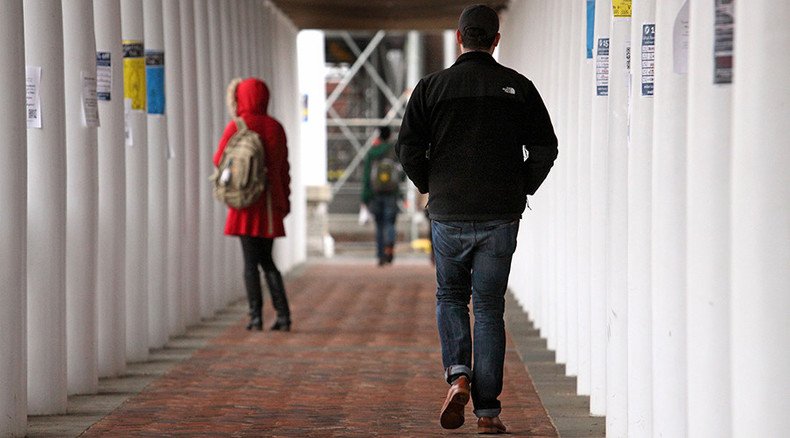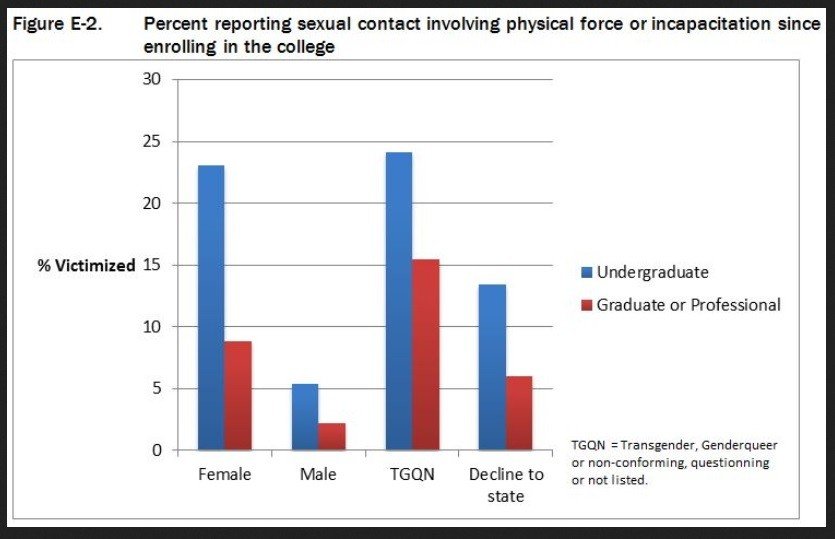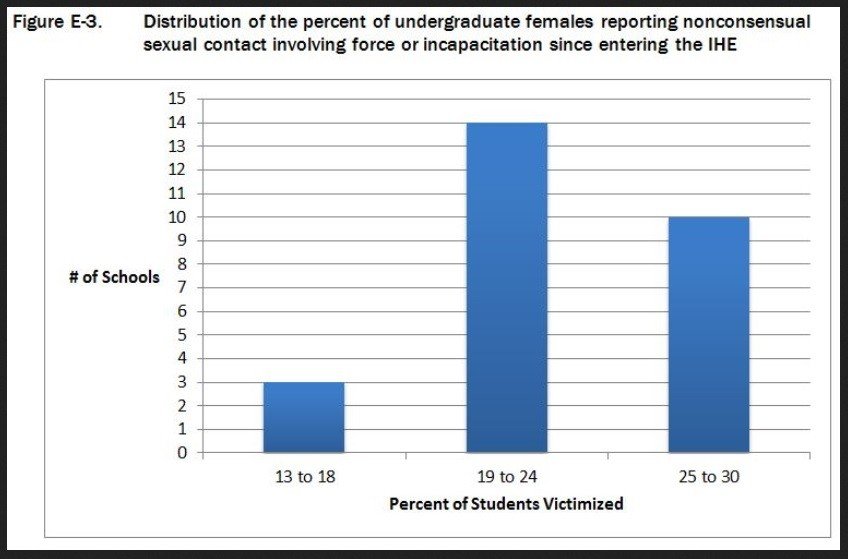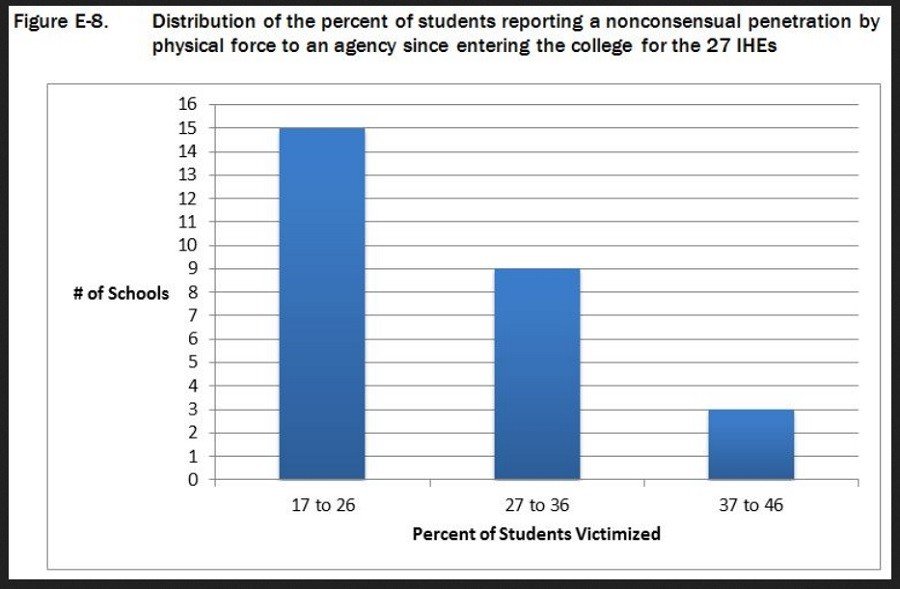Almost a quarter of women raped or sexually assaulted in college

Nearly one in four female undergraduates has experienced some type of sexual assault – meaning they were penetrated or touched in a sexual way without their consent – according to a new study. Freshman women are most likely to be victims.
Just over 23 percent of female undergraduate students reported that they had been sexually assaulted since enrolling in college, of which 10.8 percent said they have been raped, meaning they experienced penetration. The poll, which surveyed students at 27 nationally known universities, was conducted for the Association of American Universities (AAU) by Westat, a statistical research corporation.
Overall, 11.7 percent of students surveyed reported having experienced nonconsensual penetration or sexual touching by force or incapacitation since beginning college. Rates of sexual assault and misconduct were highest among undergraduate females and those identifying as TGQN (Transgender, Genderqueer or non-conforming, Questioning, Not Listed), AAU found. The risk of the most serious types of sexual assault declined during the college years, with 16.9 percent of female freshmen reporting being assaulted, as opposed to 11.1 percent of seniors.

“Students who are relatively new to school may experience higher risk because they are not as familiar with situations that may lead to an incident of sexual assault or misconduct,” AAU noted in its findings.
Education Secretary Arne Duncan told the Washington Post last week that the number of students who experience sexual assault on campus has been “unacceptably high” for decades.
“It is shockingly bad, but it is the truth,” Duncan said. “It’s just like gun violence. I’m shocked every day at the level of gun violence in this country. But it’s the truth. We can either hide from that reality, or not.”

Moreover, reporting rates of sexual assaults occurring in college are low. Overall, only between 5 and 28 percent of such incidents are reported, depending on the campus.
“When students were asked why they did not report incidents of sexual assault and sexual misconduct, the most common reason was that it was not considered serious enough,” the report found. “Other reasons included because they were ‘embarrassed, ashamed or that it would be too emotionally difficult,’ and because they ‘did not think anything would be done about it’.”
Last May, the US Department of Education announced it was investigating 55 US colleges and universities in connection with allegations that they mishandled or ignored sexual assault and sexual harassment complaints.
Of the 26 AAU members who participated in the survey, seven are under investigation by the Department of Education: Harvard, Michigan, Michigan State, Ohio State, North Carolina, Southern California and North Carolina. Dartmouth is both under investigation and participated in the AAU survey as a non-member. An additional 10 members are under investigation, but chose not to participate: Berkeley, Boston University, Carnegie Mellon, Colorado, Emory, Indiana, Penn State, Princeton, University of Chicago and Vanderbilt.
Dartmouth students punished for protesting rape http://t.co/KYD12MHK0N
— RT America (@RT_America) May 30, 2013The AAU believes its survey will help federal efforts to create a nationwide campus sexual assault survey.
“AAU undertook this initiative to assist our universities in their ongoing efforts to address sexual assault and sexual misconduct on campus,” Hunter Rawlings, president of the 62-member group, said in a statement.
Researchers at Westat noted that the victimization rate may be overstated, as the response rate was less than 20 percent. Still, they pointed out, more than 150,000 students at the 27 schools participated in the survey, making it one of the largest research efforts of its kind.

The survey used a broad definition of sexual assault that included sexual touching or kissing, as well as penetration. This could lead people to respond that they had been sexually assaulted who wouldn’t describe themselves as victims of such crimes.
“This confirms that when doing these kinds of surveys, it’s important to make those distinctions when publishing victimization rates,” David Cantor, vice president of Westat, said.
Muddying the waters, consent means different things to different people in different circumstances, a Washington Post-Kaiser Family Foundation poll published in June found. When asked if undressing, getting a condom or nodding in agreement constituted consent, at least 40 percent of current and recent college students said the action established consent for more sexual activity while at least 40 percent said it didn’t.
Silence is not sexual consent: California passes ‘Yes Means Yes’ bill http://t.co/dahw2YjKv3
— RT (@RT_com) September 30, 2014“Obviously situations are different every time,” Joshua Johnstone, 21, a student at the University of North Carolina at Greensboro, told the Washington Post. “I would say nodding is okay. But I’ve had a situation where somebody nodded at me and I asked again, just to be sure. And she said yes.”
A 2014 University of Oregon online survey discovered that more than a third of female students on the Eugene campus reported being sexually assaulted, and 10 percent said they had been raped during their collegiate careers. However, the AAU study found that 24 percent of undergraduate women said they were victims of nonconsensual sexual contact, with 11 percent saying they were victims of nonconsensual sexual penetration. A recent survey at the University of Kentucky, which did not participate in the AAU poll, found that 4.9 percent of students had been raped or been the victims of attempted rape during the last school year.












